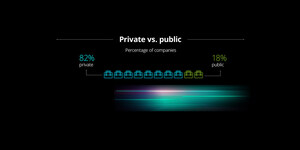NEW YORK, May 13, 2015 /PRNewswire/ -- There is a growing generational gap in how diversity and inclusion is defined in today's workplaces, according to "The Radical Transformation of Diversity and Inclusion: The Millennial Influence" a new study by Deloitte and the Billie Jean King Leadership Initiative (BJKLI). The research shows that Millennials see inclusion as vital to business success and believe cognitive diversity is critical to engagement, empowerment, business growth and competitiveness. In contrast other generations tend to view it through the traditional lenses of demography, representation, and assimilation.
"When we launched the Billie Jean King Leadership Initiative last November, we set out to effectively move the needle on issues impacting the landscape of today's global workplaces," said Billie Jean King. "This work is a first step towards spotlighting the urgent need for companies to reevaluate their approach to diversity and inclusion in order to retain millennial talent, remain competitive, and foster innovation."
The research also found that millennials believe inclusion is the support for a collaborative environment that values open participation from individuals with different ideas and perspectives and the unique factors that contribute to their personalities and behaviors. These generational differences could have major implications on the ways in which organizations seek to address diversity and inclusion. Additional findings from the research include:
- When defining diversity, millennials are 35 percent more likely to focus on unique experiences, whereas 21 percent of non-millennials are more likely to focus on representation.
- When asked about the business impact of diversity, millennials are 71 percent more likely to focus on teamwork compared with 28 percent of non-millennials who are focused on fairness of opportunity.
- Millennials are 33 percent more likely to disagree with the statement that their "work has an impact on the organization." They are also 13 percent less likely to say they feel excited to go to work and that they are attached to their organization.
- However, 83 percent of millennials are actively engaged when they believe their organization fosters an inclusive culture, compared to 60 percent of millennials who are actively engaged when their organization does not foster an inclusive culture.
- Millennials believe that programs aimed at diversity and inclusion should focus on improved business opportunities and outcomes as a result of the acceptance of cognitive diversity, specifically individualism, collaboration, teamwork and innovation.
"With Millennials on pace to make up 75 percent of the workforce by 2025 and as workplaces evolve, it is not completely surprising that there are stark differences in how generations view inclusion in today's business environment," said Christie Smith, managing principal, Deloitte University Leadership Center for Inclusion, Deloitte LLP. "Our data makes it clear that diversity is no longer about race, gender, and ethnicity, instead millennials are demanding that leaders foster inclusive cultures by building teams made up of people with the diverse opinions, experiences, and backgrounds necessary to achieve desired business outcomes. It is important for organizations to recognize this shift and evolve their thinking or they may risk losing current and future talent."
About "The Radical Transformation of Diversity and Inclusion: The Millennial Influence" Report
The online, anonymous survey consisted of 62 questions answered by respondents from seven different sectors: (1) Consumer and Industrial Products; (2) Banking; (3) Financial Services; (4) Health Care; (5) Professional Services; (6) Entertainment; and (7) Technology, Media and Telecommunications.
The survey was updated on March 27, 2015 to incorporate all respondents to date. The 3,726 survey respondents included individuals from a variety of backgrounds, with representation across gender (male, female), race/ethnicities ("Asian," "Black or African American," "Hispanic or Latino," "Multiracial" and "White"), generations (those born between 1946 and 1964, those born between 1965 and 1980, and those born after 1980), sexual orientation (heterosexual, LGB and other), foreign national status, veteran status, disabilities (physical, mental or emotional), level within an organization (executive, management, staff and other), and tenure with an organization.
The survey asked respondents about their organization's approach to diversity and inclusion, how diversity and inclusion is valued, how favorable their employee experience has been, and how the resources the organization provides has impacted these experiences and their performance. It also asked how the leadership, culture and values of their organization require them to cover their authentic selves, and what concrete actions could be taken to create a climate in which their full selves can be harnessed for optimal engagement, innovation and performance.
About the Billie Jean King Leadership Initiative
The Billie Jean King Leadership Initiative (BJKLI) is a nonprofit organization founded by Billie Jean King in partnership with Teneo as part of an effort to encourage companies, corporations and individuals to embrace those with diverse personalities, backgrounds and lifestyles for the positive and unique contributions they bring to the workforce. The BJKLI's three pillars – Lift, Learn, and Lead – are dedicated to inspiring those in positions of power to promote diverse identities and challenge the status quo. To learn more about the BJKLI and to find out ways your organization can get involved please visit BJKLI.
About the Deloitte University Leadership Center for Inclusion
The Deloitte University (DU) Leadership Center for Inclusion is a manifestation of Deloitte's commitment to advance the conversation, continue to challenge the status quo, and lead from the front in inclusion. The new center provides a place (both at DU and virtually) and a platform for coming together to engage with our people, our clients, and thought leaders on issues that will help us better understand and contribute to what inclusion will look like in the future.
As used in this document, "Deloitte" means Deloitte LLP and its subsidiaries. Please see www.deloitte.com/us/about for a detailed description of the legal structure of Deloitte LLP and its subsidiaries. Certain services may not be available to attest clients under the rules and regulations of public accounting.
Logo - http://photos.prnewswire.com/prnh/20120803/MM52028LOGO-a
SOURCE Deloitte
Related Links
WANT YOUR COMPANY'S NEWS FEATURED ON PRNEWSWIRE.COM?
Newsrooms &
Influencers
Digital Media
Outlets
Journalists
Opted In






Share this article